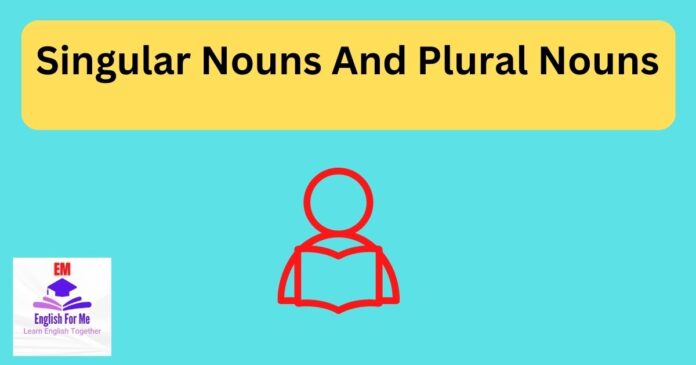Nouns are classified as the singular nouns and the plural nouns regarding their number. A noun which denotes one thing is said to be in the singular number whereas that which denotes more than one thing is said to be in the plural number. The Most Common Rules For Forming Plural Nouns have been given below:
Plural Nouns are formed By adding ‘s’ to the singular:
| Singular Nouns | Plural Nouns |
|---|---|
| Book | Books |
| Pen | Pens |
| table | tables |
| friend | friends |
| girl | girls |
| element | elements |
By adding ‘es’ at the end of a singular noun if it ends in s, sh, x, ch, z:
| Singular Nouns List | Plural Nouns List |
|---|---|
| bus | buses |
| brush | brushes |
| box | boxes |
| torch | torches |
| topaz | topazes |
By adding ‘s’ to a singular noun if it ends in ‘y’ and if there is a vowel before the ‘y’:
| Singular Nouns | Plural Nouns |
|---|---|
| toy | toys |
| boy | boys |
| holiday | holidays |
| guy | guys |
| key | keys |
Plural Forms of Nouns ending in ‘f’ or ‘fe’ : ‘f’ or ‘fe’ turns into ‘ves’
| Singular | Plural Forms of Nouns |
|---|---|
| wife | wives |
| life | lives |
| knife | knives |
| thief | thieves |
| leaf | leaves |
| calf | calves |
| Exception to the rule | |
But there are exception to the rule : proof-proofs; chief-chiefs; safe-safes; fife-fifes; puff- puffs; pouf- poufs, roof-roofs
There are still other singular nouns ending in ‘f’ which form their plural by following both the above methods and both the plurals thus obtained are correct.
Singular
| Singular Nouns | Plural Nouns Accepted Two Ways |
|---|---|
| hoof | hoofs / hooves |
| scarf | scarfs / scarves |
| wharf | wharfs / wharves |
| turf | turfs / turves |
Singular nouns ending in ‘o’ and have a consonant before that ‘o’, form their plural nouns by adding ‘es’ to the singular:
| Singular Nouns | Plural Nouns |
|---|---|
| mango | mangoes |
| hero | heroes |
| zero | zeroes |
| buffalo | buffaloes |
| cargo | cargoes |
| mosquito | mosquitoes |
| potato | potatoes |
| tomato | tomatoes |
| echo | echoes |
| video | videos |
| Negro | Negroes |
Exception
Canto – Cantos; Dynamo- Dynamos; Piano – Pianos; Memento – Mementos ; Manifesto – Manifestos ; Photo- Photos
Singular nouns ending in ‘o’ and having a vowel before that ‘o’, form their plural by adding ‘s”:
Singular
| Singular Nouns | Plurals |
|---|---|
| studio | studios |
| radio | radios |
| audio | audios |
| cuckoo | cuckoos |
| folio | folios |
Some nouns form their plurals by changing the vowel sound of the singular:
| Singular Nouns | Plural Nouns |
|---|---|
| man | men |
| tooth | teeth |
| foot | feet |
| woman | women |
| mouse | mice |
| child | children |
| goose | geese |
| louse | lice |
Compound nouns get their plural by adding ‘s’ to the main or the principal word.
(a) In some cases it is the first word that forms the plural:
| Daughter-in-law | Daughters-in-law |
| Hanger-on | Hangers-on |
| Sister-in-law | Sisters-in-law |
| Commanders-in-chief | Commanders-in-chief |
| Brother-in-law | Brothers-in-law |
| Son-in-law | Sons-in-law |
| Looker-on | Lookers-on |
| Passer-by | Passers-by |
(b) Examples where the second word forms the plural:
| Singular Compound Nouns | Plural Compound Nouns |
|---|---|
| Book-case | Book-cases |
| Class-fellow | Class-fellows |
| Grand-father | Grand-fathers |
| Grand-mother | Grand-mothers |
| class-mate | class-mates |
| Race-horse | Race-horses |
| Step-son | Step-sons |
(c) Examples where both words make the plural:
Maid-servant – Maids-servants
Man-servant – Men-servants
Woman-servant – Women-servants
Lord-justice – Lords-justices
SOME INTERESTING FACTS ABOUT NOUNS – One of the Eight Parts of Speech
1. ‘Cousin’ is never followed by ‘brother’ or ‘sister’.
2. We do not write a man. We write to a man.
3. Boarding is a wrong use. It should be ‘boarding house’.
4. ‘Poor people’ is a slang use. It should be ‘the poor’.
5. ‘Signature’ should be used in place of the abbreviation ‘sign’.
6. Food taken once is ‘meal’ and not ‘meals’. Meals means both lunch and dinner’ and we cannot take them together.
7. ‘Vacation’ is one term. Hence it is singular.
8. ‘Tickets’ mean ‘the number of tickets’. “Ticket’ means ‘the mode of entry’.
9. ‘Alphabet’ is generally used in the singular sense. But it can also be used in the plural sense when different languages are referred to at the same time.
10. ‘Inning’ is no word. The actual word is ‘innings and is always used in the singular sense.
11. English teacher’ is slang. It should be ‘the teacher of English’.
12. ‘Noun’ or ‘pronoun’ after ‘one of ‘should always be plural.
13. Agendum’ is not used in English. Agenda (Programme of a meeting) is treated as singular in English.
14. ‘Mankind’ is not used in the plural sense. 15. ‘Room’ in a compartment or on a bench, etc. means ‘unoccupied seat.”
16. ‘Witness’ means knowledge brought in proof. “Evi- dence’ denotes means of proving an unknown or disputed fact.
17. Family members’ is a slang use. The correct form is ‘members of the family’.
18. “Goodnight” is a parting salutation, but “Good evening” is a meeting salutation from evening till midnight.
19. If two singular nouns joined by ‘and’ refer to the same thing, the verb used with them should be singular.
20. ‘Wages’ when used in the singular form means ‘pun- ishment’ but when used in the plural sense, it means ‘charges for the labour’.
21. Jury’ and ‘Committee’ are collective nouns. When they are used to convey the oneness of their action, they get a singular verb but when used to express difference in their action, they get a plural verb.
22. The use of double possessive should be avoided. It is better to write the ‘son of my uncle’s friend’ than ‘my uncle’s friend’s son”.
23. The use of (‘s) is usually limited to living things, ‘Of is used in the case of lifeless things, e.g. The girl’s leg; but the leg of the table (and not the table’s leg).
24. When two nouns indicate common possession, (‘s) is added to the later one; when they indicate separate possession, (‘s) is added to each one of them; e.g. Mohan and Sohan’s father. Mohan’s and Sohan’s father.
25. Our’s, your’s, her’s their’s is wrong.
(One person) (Two persons)
Ours, yours, hers, theirs is correct.
26. The following nouns are always used in plural:
arms, annals, bowels, surroundings, stocks, breeches, eatables, fetters, goods, mumps, measles, movables, premises, proceeds, pantaloons, riches, stockings, alms, spectacles, scissors, shorts, thanks, tidings, tongs, trousers, valuables, wages, police, people, poultry, gentry, public, cattle, vermin, clergy, Billiards, folk.
27. The following nouns are always used in the singular.
gymnastics, gallows, information, cavalry, infantry, innings, mathematics, mechanics, news, politics, physics, summons, issue, offspring, abuse, advice, rice, gram, fuel, furniture, stationery, scenery, poetry, mischief, alphabet, hair, bunting, bedding athletics, classics, economics.
Boost your vocabulary by studying synonyms and antonyms which will be helpful for competitive exams like upsc, mpsc.








Nice information .
Great!